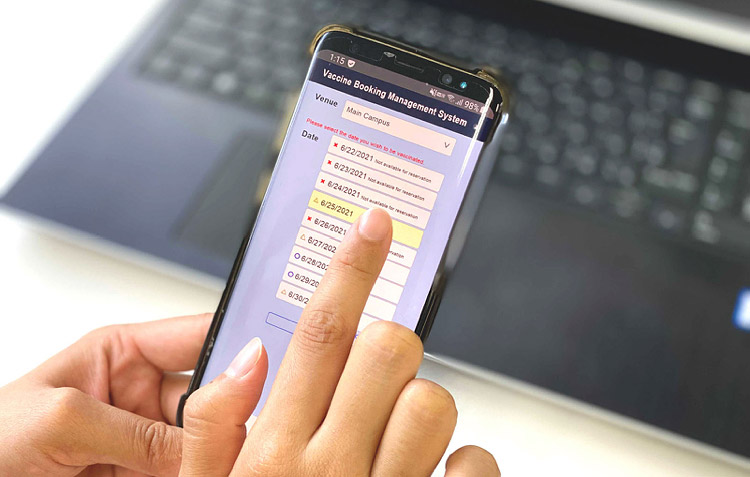Proposal for new "lottery batch system" for booking COVID-19 vaccine appointments
"Recently, I have been working with my colleagues on online booking systems, with particular focus on the allocation of appointments slots for public services," says Morimitsu Kurino, a professor at the Faculty of Economics at Keio University specializing in market design, and specifically, on creating venues and formats for buyers and sellers to meet and interact. "For example, think about what happens when demand is bigger than supply. For ordinary goods such as ice cream, the price will go up until the demand is equal to the supply. However, in the case of public services that are free of charge, the price cannot adjust the balance of demand and supply. In such scenarios, the widely used 'first-come, first-served' system can lead to the severe problem of unfair access to public services. We are trying to resolve such issues."

Applying for a vaccination appointment using a "first-come, first-served" system ©︎ Keio University
As an example, Kurino highlights two harmful effects of the first-come, first-served system in booking appointments for Covid-19 vaccinations. The first is access concentration that results from the fact that everyone's optimal strategy is to apply at the start. The second is scalping, where unscrupulous people use bots to quickly book appointment slots under fake names. "Such scalpers book and cancel slots, and then rebook them under their customers' names for reselling," says Kurino. "It can have catastrophic effects in the midst of a crisis such as the Covid-19 pandemic." In their recent paper, Kurino and his colleagues describe examples of the effects of scalping in the real world, including evidence observed in Irish Immigration services1.
Proposal of the "lottery batch system" for public services
In their paper, Kurino and his co-researchers propose their "lottery batch system" to overcome the deficiencies in the first-come-first-served system for public services. "In our system, we first set a specific time interval for collecting applications," explains Kurino. "Next, applicants must submit their lists of preferences for times and dates for appointment slots. Then, and importantly, in our approach, the applications are ranked randomly, and not on a first-come, first-served basis. The last step is to select assignments so that applicants successively pick their preferred time slots."
Notably, the advantage of the system proposed by Kurino and colleagues is that that it eliminates the importance and necessity for speed to apply for slots because applicants will have the same probability of getting slots, irrespective and independent of when they apply. So, their innovative approach relieves the concentration of online access, and, no single applicant benefits from using scalpers, and thereby, scalping is no longer profitable.
"Our research has demonstrated the results of our 'lottery batch system' to be fair in the sense that every applicant has the same chance of getting a slot," says Kurino. "Hence when demand exceeds supply, the current first-come, first-served system does not work properly, but our system is robust and works to serve the public fairly, especially in the midst of crises."
Published online 27 August 2021
About the researcher

Morimitsu Kurino ― Professor
Faculty of EconomicsMorimitsu Kurino was born in Kagoshima, Japan, in 1973 and received his Ph.D. in 2009 from the University of Pittsburgh, USA. He then went on to work at the Max Planck Institute of Economics, Maastricht University, WZB Berlin, and the University of Tsukuba. In 2018, he joined the Keio University Faculty of Economics as a professor. His research interests are in how to design rules for matching goods and people in real-life markets.
Links
Reference
- R. Hakimov, C.-P. Heller, D. Kübler, M. Kurino, How to Avoid Black Markets for Appointments with Online Booking Systems, Am. Econ. Rev. 111, 2127-2151, (2021).| article